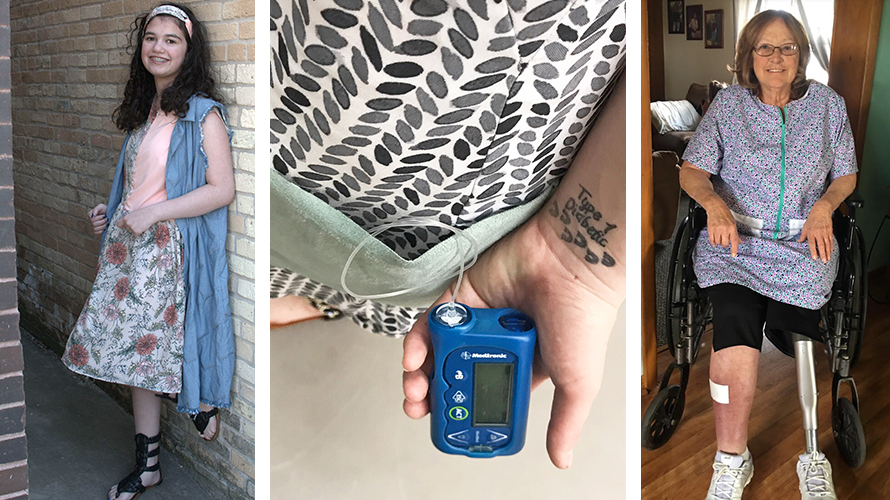Garments designed by Iowa State students improve quality of life for people with disabilities
05/14/2018

Garments designed by Iowa State students in apparel merchandising and design students are making life a little easier for children fellow students and relatives with disabilities. Contributed photos
Shelby Miller, an Iowa State University freshman in animal science, can’t usually wear a dress. Her Type 1 diabetes requires her to have an insulin pump connected to her body at all times, and she needs access to that pump throughout the day.
“I don’t really get to wear dresses to go out to eat because if I do, it’s like, ‘How am I going to get my pump out?’” Miller said. “When I went to prom, I had to tell my date, ‘Hey, I need you to cover for me, I need to pull my pump out,’ and I had to pull my dress up. It’s really challenging. It gets frustrating. Sometimes, I want to be a girly-girl and it’s hard to be that when you really can’t.”
But a dress designed this spring by Devan Bridson, an Iowa State senior in apparel, merchandising, and design, has given Miller something to wear on her next date with her boyfriend — which provides access to the pump but won’t call attention to the medical device.
“This project has really opened my eyes to this realm of design I had not thought of before,” Bridson said. “It’s not something that just looks pretty. It’s something that’s really functional that can solve problems.”
Making life a little easier
Garments designed this spring by apparel, merchandising, and design students in Ellen McKinney’s creative design processes class are making life a little easier for children, fellow students, and relatives with disabilities.
The project, called “Design for all,” involved slight modifications to garments to make them more comfortable and functional. That means fabrics with a lot of stretch, softer fabrics, no itchy tags, zippers to make garments easier to get on and off, and pockets that can hold what’s needed — all while keeping the client’s preferences and style in mind.
“It’s just really great to know you made something for someone and it might change their quality of life,” said Carolyn Schar, a senior in apparel, merchandising, and design who designed clothing for her mom, Maryanne, who has Rheumatoid arthritis.
Sadie Petersen designed a dress and pants for her 66-year-old grandmother, Kathy Korner of Schleswig, a former nurse who now has a prosthetic leg. Petersen used soft fabrics, a front zipper on the dress, and a side zipper on the pants to make things easier for her grandmother. She also made sure the back rise of the pants wasn’t too short when her grandma sat in a wheelchair.
Another student team worked on a sleeveless dress that would be comfortable for Carlie Howard’s 16-year-old cousin, Camila Smith, who has autism. The outfit included a weighted vest to prevent anxiety, travel patches to reflect her cousin’s love of travel, and a headband to help prevent loud noises.
“I would have never thought that clothing could potentially help Camila but from this project, I see it could,” Howard said. “She absolutely loved the design.”
Adaptive clothing in the fashion industry
Tara Efobi, a recent graduate in apparel, merchandising, and design, worked on “adaptive clothing” for people with disabilities while interning at Target last summer. The internship sparked a desire to continue the work.
This spring, Efobi joined classmates Lydia Loya and Erin Connor on a project working with Collin Hillinger, a freshman in mechanical engineering who has Osteogenesis imperfecta, also known as brittle bone disease.
While Hillinger said he doesn’t have too much difficulty with clothing, suits sometimes don’t lay well while sitting in a wheelchair. The three students designed and constructed Hillinger a new suit jacket and pants that work better for him.
“It’s important to think about all people in any design endeavor,” said Efobi, who this summer begins a new job as an associate designer for women’s ready-to-wear clothing at Target. “You can still make things that look really beautiful, but also serve more of a function and more of a purpose, as well. We talk about how clothes can really impact people’s lives but we don’t think about the deeper meaning of that. During my internship and in this class, I got to explore that a little bit more.”
The Iowa State apparel students said working with people with disabilities taught them to be more mindful, and called attention to the fashion industry needing to be more inclusive. It also taught them that fashion design is more than just artistic expression — but a way to enhance daily life.
“That’s something we’re all interested in, exploring more and looking at the functional aspect of design,” said Emily Clark, a recent graduate in apparel, merchandising, and design.
Key contacts
Ellen McKinney, assistant professor; Department of Apparel, Events, and Hospitality Management; Iowa State University, 515-294-7536, emckinne@iastate.edu
Lynn Meadows, communications specialist, College of Human Sciences, Iowa State University, 515-294-3689, lynnm@iastate.edu